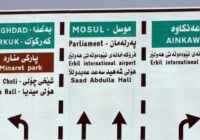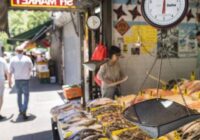Erdogan’s government must seek a political resolution to the deepening conflict in Turkey, which has no end in sight.
With the latest terrorist attack on Turkish soil—twin blasts close to the Besiktas football stadium in Istanbul that killed at least 38 people and injured many more—the inevitable focus will be on heightened security, an expectation of solidarity from global allies, and questions about how it was able to happen.
The fact remains, however, that another terrorist attack in Turkey is sad, yet almost inevitable. It was clear from the outset that this was likely to be a Kurdish militant attack. Three broad groups have been responsible for multiple attacks over the past year in Turkey: Islamist extremists, left-wing radicals and Kurdish militants.
To strike outside the Besiktas football stadium—a club known for its traditionally left-leaning support base—would be a strange target for left-wing groups. To target the police, who were the majority of the victims, would be unusual for Islamic State-inspired extremists, who tend to focus on soft, civilian targets, often in areas frequented by Western tourists.
Sure enough, the attack was claimed by the Kurdistan Freedom Hawks (TAK), a splinter group of the more widely known Kurdistan Workers’ Party (PKK). The distinction will matter little to Turkey’s government, and perhaps even less to shocked outside observers around the world. Yet in that distinction lies the heart of the problem in Turkey today.
Turkey: Fighting at the extremes
The nuance that President Recep Tayyip Erdogan’s government will avoid drawing out is that the TAK represents the most extreme wing of Kurdish militancy in Turkey. While Kurdish militants of the TAK still proclaim that the imprisoned Abdullah Ocalan is their leader, they exist as an expression of the dissatisfaction among some with the passive direction of the PKK in the mid-2000s, when it began engaging politically with the Justice and Development Party (AKP) government.
How much the TAK and the PKK work together or apart is hard to assess in the opaque world of militancy, yet at the other end of the spectrum, the near-outlawed political party, the Peoples’ Democratic Party (HDP), is widely regarded as the non-violent political affiliate of the PKK in Turkish politics. While there is a continuum of Kurdish political activism from the TAK to the HDP, there is a wide gulf between them in terms of actions.
It is in that gulf that Erdogan’s government must seek a political resolution to the deepening conflict in the country. Yet it is a conflict for which no end appears to be in sight. Indeed, two parallel events have conspired to make a reduction in this conflict highly unlikely. Ironically, they are events in which the PKK was not directly involved.
The first is the rise of Islamic State (IS) in neighboring Syria, and the second is the attempted coup of July 2016 in Turkey. In combination, both events have placed Erdogan in a combative role as president—the footing of a classic war president. It has increased the nationalist posturing of his government, which has led it back into old conflict paradigms of the Turkish state.
Whether these events have accelerated a trend that Erdogan’s government was likely to follow eventually anyway, or whether they pushed it toward this extreme and away from consensus politics is hard to judge. However, the destination is the same. There is increasingly little daylight between the position of the ruling AKP and that of the hardline nationalist—and avowedly anti-Kurdish—MHP, or Nationalist Movement Party, in the Turkish political landscape.
Had Erdogan and the PKK leadership acted differently, the Turkish engagement in Syria against the Kurdish People’s Protection Units (YPG) might not have the character that it does, and the post-coup crackdown on Kurdish political figures within Turkey might not have occurred. After all, the AKP government itself has not claimed the coup to be a Kurdish plot, but rather one perpetrated by Fethullah Gulen’s Islamist movement.
The strength to bend
Supporters of the Turkish government might ask why it should be they that change course. The usual mantra is that one should never bow to terrorists and that any compromise is defeat.
 But the facts on the ground are such that Erdogan’s government now has the undisputed upper hand in Turkish politics. It has no threat from within the parliamentary system. President Erdogan is increasingly unchallengeable.
But the facts on the ground are such that Erdogan’s government now has the undisputed upper hand in Turkish politics. It has no threat from within the parliamentary system. President Erdogan is increasingly unchallengeable.
Faced with a build-up of Turkish nationalism from the ruling party, the reaction in Kurdish militancy is a similar move to the extremes. Yet in any battle, the weaker side has a tendency to entrench its positions. Its very weakness makes it loath to offer an olive branch. Were Erdogan’s government—from a position of strength—to play peacemaker with those Kurdish activists willing to reject violence, it could set the agenda.
Whenever Erdogan feels the time is right, he must rediscover an ability to apply the carrot as well as the stick. If he doesn’t, he may be left with an increasingly ungovernable country.
The views expressed in this article are the author’s own and do not necessarily reflect Fair Observer’s editorial policy.
Photo Credit: Punghi
Support Fair Observer
We rely on your support for our independence, diversity and quality.
For more than 10 years, Fair Observer has been free, fair and independent. No billionaire owns us, no advertisers control us. We are a reader-supported nonprofit. Unlike many other publications, we keep our content free for readers regardless of where they live or whether they can afford to pay. We have no paywalls and no ads.
In the post-truth era of fake news, echo chambers and filter bubbles, we publish a plurality of perspectives from around the world. Anyone can publish with us, but everyone goes through a rigorous editorial process. So, you get fact-checked, well-reasoned content instead of noise.
We publish 2,500+ voices from 90+ countries. We also conduct education and training programs
on subjects ranging from digital media and journalism to writing and critical thinking. This
doesn’t come cheap. Servers, editors, trainers and web developers cost
money.
Please consider supporting us on a regular basis as a recurring donor or a
sustaining member.
Will you support FO’s journalism?
We rely on your support for our independence, diversity and quality.






